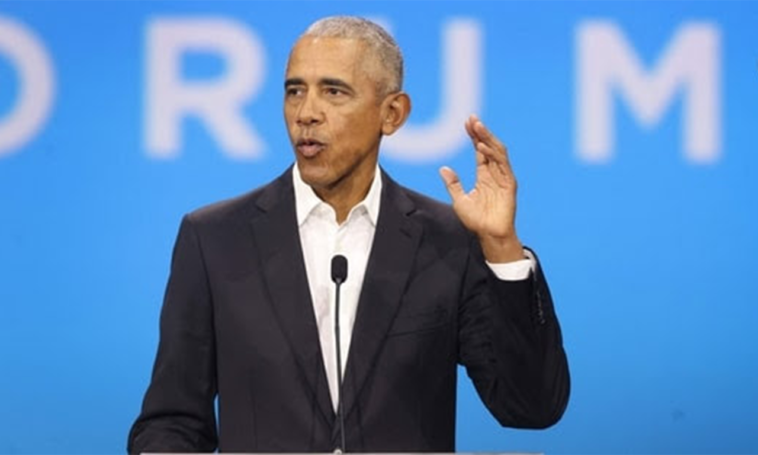- Obama has faced criticism for demonizing white people. In the realm of entertainment, a recent film has thrust former President Barack Obama into the spotlight.
“Leave the World Behind,” produced by Obama’s company, Higher Ground, and released on Netflix, has ignited a conversation about the role of race and societal tensions in the portrayal of a crisis scenario.
Obama has faced criticism for demonizing white people. “The film, based on Rumaan Alam’s novel, revolves around two families navigating the challenges of a nationwide blackout, and Obama’s involvement included providing feedback on the script to enhance its realism.”
~IMDB.
However, amidst the critical acclaim and intrigue surrounding the film, a specific scene has become a point of contention. The scene features a Black couple in bed, delivering lines that caution against easily trusting anyone, especially white people, in the face of a world falling apart.
This dialogue has triggered criticism on social media platforms, with some users expressing concerns that the scene demonizes white people and characterizing it as racist.
Libs of TikTok, a prominent conservative account, articulated these concerns on X, stating, “Netflix film called ‘Leave The World Behind’ produced by the Obamas includes a scene demonizing white people. White people are the only group you’re allowed and celebrated to be racist towards.”
This sentiment reflects a broader debate on the portrayal of racial dynamics in media and the responsibility of creators, especially when associated with public figures such as Barack Obama.
Social Media criticism amplified the controversy by highlighting the film’s warning about white people in the context of a world on the brink of collapse.
While some critics lambasted Obama for his role in the production, others took a different stance. Sports journalist Jemele Hill, for instance, praised the Obamas’ executive producer credit, describing it as “exquisite, masterful trolling.”
This divergence in opinions underscores the complexity of addressing sensitive themes in storytelling, especially when influenced by political figures.
Amidst the debates and criticisms, an X user named MissMa’am brought attention to the film’s exploration of crucial themes. “Leave the World Behind touches on so many important things, but my fave is that when the world goes to s***, black people should not be quick to trust anyone, especially white people… And we shouldn’t be doing s*** for them out of the kindness of our hearts.”
This perspective highlights the nuanced layers the film aims to unpack, delving into trust issues and societal dynamics during times of crisis.
The film’s source material, Rumaan Alam’s novel, serves as the foundation for a narrative that confronts societal tensions and trust issues in a world grappling with a blackout.
Despite the controversy, “Leave the World Behind” acts as a platform for meaningful discussions on race, trust, and the complexities of human interactions. It aligns with Barack Obama’s commitment to projects that address significant and thought-provoking issues, showcasing a continued dedication to storytelling that engages with real-world challenges.
The controversy surrounding this film extends beyond its immediate impact, opening up broader discussions about the responsibilities of creators, the interpretation of themes, and the intersection of entertainment and societal dynamics.
The film’s portrayal of caution in trusting others during a crisis, especially along racial lines, reflects the realities of a deeply divided world and prompts audiences to reflect on their perspectives and biases.
“Leave the World Behind” has become more than just a film; it has become a catalyst for conversations about race, trust, and societal tensions.
Barack Obama’s association with the project adds a layer of complexity, as it invites scrutiny of how political figures engage with and influence cultural narratives.
As audiences grapple with the nuances of the film, it remains a testament to the power of storytelling to elicit thought, discussion, and reflection on the intricacies of the human experience.




2 Comments
Leave a Reply2 Pings & Trackbacks
Pingback:Obama thinks Biden and Democrats could very well lose
Pingback:Former Obama Administration Official Attempted to Remove Chinese Drone Company from U.S. List of Chinese Military Entities - Hard Knock News
Join the Community and Be a Part of the Conversation
You must be logged in or registered to post a comment.